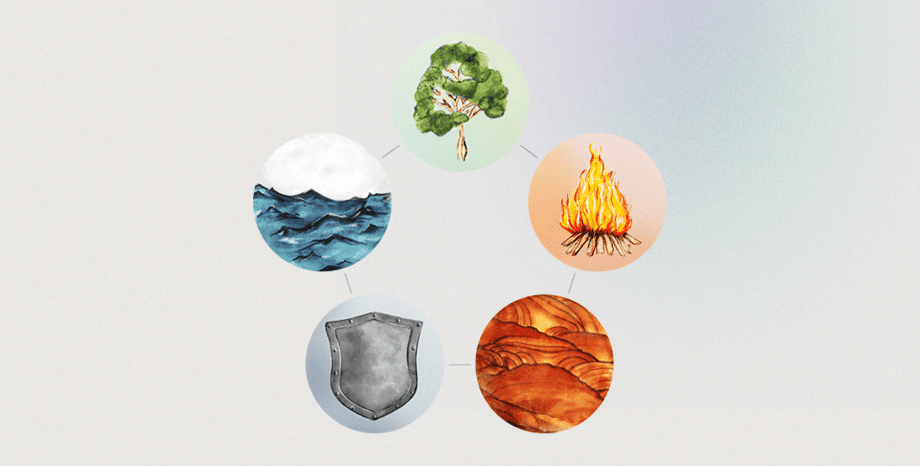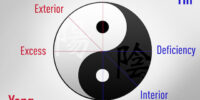Exploring The Five Elements Theory In Chinese Medicine: Wood, Fire, Earth, Metal, And Water

The Five Elements theory is a fundamental concept in Chinese medicine that explores the interconnectedness and dynamic balance of wood, fire, earth, metal, and water within the body and the natural world. This theory stems from ancient Chinese philosophy and provides insights into the body’s health and wellbeing.
Each element represents specific qualities and characteristics that influence various aspects of the body and mind.
In this article, we will delve into the Five Elements theory and its role in Chinese medicine. We will explore the unique properties and functions of each element, such as wood’s role in growth and flexibility, fire’s influence on passion and vitality, earth’s importance for stability and nourishment, metal’s role in respiration and elimination, and water’s connection to fluid balance and energy.
Furthermore, we will examine how these elements interact and affect one another within the body, leading to either balance or imbalance. Understanding the Five Elements theory can provide valuable insights into maintaining optimal health and wellbeing.
We will also discuss practical applications of this theory in daily life and the holistic perspective of the Five Elements in the context of nature.
Wood Element: Exploring its Role in the Body and Health
The Wood element in Chinese medicine plays a crucial role in maintaining balance and harmony within the body, contributing to overall health and well-being.
According to the five elements theory, Wood represents growth, creativity, and the power of decision-making. It is associated with the liver and gallbladder organs, as well as the color green.
In terms of the body, the Wood element governs the smooth flow of qi, or vital energy, and ensures the proper functioning of the muscles and tendons.
When the Wood element is in balance, a person experiences flexibility, adaptability, and the ability to make clear decisions. However, imbalances in the Wood element can lead to symptoms such as irritability, anger, and muscle tension. Therefore, maintaining the balance of the Wood element is essential for optimal health and well-being.
Fire Element: Understanding its Influence on the Body and Mind
The Fire Element plays a vital role in Chinese medicine, both in the body and the mind. It is associated with various functions such as warmth, transformation, and circulation.
The Fire Element corresponds to the organs of the heart and small intestine, and its imbalance can manifest as symptoms related to these organs.
Emotionally, the Fire Element is linked to joy and excitement, but excessive Fire can lead to restlessness and insomnia.
Functions of the Fire Element
When examining the functions of the Fire element in Chinese medicine, one cannot help but appreciate its transformative and dynamic nature. The Fire element is associated with the heart and small intestine, and its primary function is to govern circulation and transformation. It is responsible for maintaining the vitality and warmth of the body, as well as regulating mental activities and consciousness. In Chinese medicine, the Fire element is believed to be closely related to joy, enthusiasm, and passion. When in balance, it promotes love, compassion, and a sense of connection with others. However, an excess or deficiency of the Fire element can lead to imbalances such as anxiety, restlessness, or even manic behavior. Understanding the functions of the Fire element is essential in maintaining overall health and well-being.
| Function | Organ | Emotion | ||||
|---|---|---|---|---|---|---|
| Circulation and transformation | Heart | Joy | ||||
| Digestion and absorption | Small Intestine | Excitement | ||||
| Mental activities and consciousness | Mind | Happiness | ||||
| Communication and connection | Speech | Laughter | Communication and connection | Speech | Laughter | |
| Movement and physical activity | Muscles | Energy | ||||
| Respiration and oxygenation | Lungs | Serenity | ||||
| Protection and defense | Immune system | Contentment | ||||
| Elimination and detoxification | Kidneys | Relief | ||||
| Reproduction and sexual function | Reproductive organs | Pleasure | ||||
| Sensation and perception | Nervous system | Satisfaction | ||||
| Growth and development | Endocrine system | Fulfillment | ||||
| Balance and coordination | Vestibular system | Harmony | ||||
| Adaptation and response to stress | Adrenal glands | Resilience |
Note: This list is not exhaustive and may vary depending on cultural and individual beliefs and experiences.
Corresponding Organs and Emotions
Corresponding organs and emotions in Chinese medicine provide insight into the interconnectedness of the body and mind. According to the five elements theory, each element is associated with specific organs and emotions.
In the case of the fire element, the corresponding organs are the heart and the small intestine. The heart is considered the ruler of all other organs and is responsible for circulating blood and controlling mental activities. It is associated with emotions such as joy, excitement, and love.
The small intestine, on the other hand, is responsible for separating the pure from the impure and is associated with decision-making processes. Emotionally, it is linked to clarity and discernment.
Understanding the relationship between the organs and emotions in the fire element is essential in maintaining balance and harmony within the body and mind.
Earth Element: Examining its Importance for Balance and Stability
Examining the importance of the Earth element for balance and stability, it can be visualized as the solid foundation upon which all other elements rely. In Chinese medicine, the Earth element is associated with the organs of the Spleen and Stomach, which are responsible for digestion and transformation of food into energy. Emotionally, the Earth element is related to worry and overthinking. When in balance, the Earth element fosters a sense of grounding, stability, and nourishment. However, an imbalance in the Earth element can lead to digestive issues, weight gain, and a tendency towards excessive worry and overthinking. To better understand the significance of the Earth element, a table can be used to illustrate its corresponding qualities, such as color (yellow), season (late summer), and taste (sweet), as well as its related emotions, organs, and functions.
| Earth Element | Corresponding Qualities |
|---|---|
| Color | Yellow |
| Season | Late Summer |
| Taste | Sweet |
| Emotion | Worry, overthinking |
| Organs | Spleen, Stomach |
| Functions | Digestion, nourishment |
Metal Element: Discovering its Role in the Body’s Vitality
This discussion focuses on the Metal Element in Chinese medicine, exploring its functions, corresponding organs, and emotional aspects.
The Metal Element is believed to be responsible for the regulation and control of vital functions in the body, such as respiration and elimination. It is associated with the organs of the lungs and large intestine, and imbalances in the Metal Element can manifest as respiratory issues, skin problems, or digestive disturbances.
Emotionally, the Metal Element is linked to qualities such as grief, sadness, and the ability to let go and move on.
Functions of the Metal Element
The Metal element in Chinese medicine is associated with the lung and large intestine organs, and its functions involve purification, elimination, and transformation.
The lung, as part of the Metal element, is responsible for the intake of fresh air and the expulsion of waste gases. It acts as a filter, purifying the air we breathe and facilitating the exchange of oxygen and carbon dioxide in the body.
The large intestine, on the other hand, is responsible for the elimination of waste materials from the body. It ensures the smooth passage of stool and the absorption of water, while also playing a role in the elimination of toxins.
Overall, the Metal element’s functions in the body are vital for maintaining a healthy respiratory system and efficient waste elimination.
Corresponding Organs and Emotions
The Metal element in Chinese medicine is associated with the autumn season, representing the contracting and consolidating forces in nature. In the previous subtopic, we discussed the functions of the Metal Element, which include governing the respiratory system, skin, and hair, as well as regulating the distribution of qi and controlling the elimination of waste.
Now, let’s explore the corresponding organs and emotions related to the Metal element. In Chinese medicine, the Metal element is associated with the lungs and the large intestine. Emotionally, it is linked to feelings of grief and sadness. Understanding these associations can help in identifying and addressing imbalances within the Metal element.
- Lungs
- Large intestine
- Grief
- Sadness
Water Element: Exploring its Connection to the Body’s Fluids and Energy
Water element in Chinese medicine is closely associated with the body’s fluids and energy, creating a dynamic flow that nourishes and supports all bodily functions. According to the five elements theory, the water element corresponds to the kidneys and bladder, which regulate the body’s water metabolism. In Chinese medicine, the kidneys are regarded as the “root of life” and play a vital role in maintaining overall health and vitality. Emotionally, the water element is linked to fear and the ability to adapt to change. When the water element is balanced, there is a sense of calmness and wisdom. However, an imbalance can manifest as excessive fear or a lack of willpower. Understanding the connection between the water element and the body’s fluids and energy is crucial in Chinese medicine for promoting overall well-being and emotional stability.
| Water Element | Emotions |
|---|---|
| Fear | Wisdom |
| Adaptability | Calmness |
| Willpower | Excessive Fear |
| Lack of Willpower |
The Interplay of the Five Elements in Chinese Medicine
The interplay of the five elements in traditional Chinese medicine reveals a dynamic relationship between the body’s internal processes and external influences, providing a holistic framework for understanding and promoting health and well-being.
According to this theory, the five elements – wood, fire, earth, metal, and water – are interconnected and constantly interacting with each other. Each element has its own unique characteristics and functions, but they also rely on one another to maintain balance and harmony within the body.
For example, the wood element represents growth and can be nourished by the earth element, while the fire element can be controlled by the water element. Understanding the interplay of these elements allows practitioners to diagnose and treat imbalances in the body, restoring harmony and promoting optimal health.
By addressing the interplay of the five elements, Chinese medicine provides a comprehensive approach to healthcare that considers both internal and external factors.
Applying the Five Elements Theory in Daily Life
Applying the principles of the five elements theory in daily life involves observing the dynamic interplay and constant interaction between different elements, allowing for a holistic understanding of the body’s internal processes and external influences.
This theory, deeply rooted in Chinese medicine, provides a framework to maintain balance and harmony within oneself and the surrounding environment.
To apply the five elements theory in daily life, one can:
- Incorporate the wood element by spending time in nature, practicing yoga or tai chi, and eating fresh, green vegetables.
- Embrace the fire element through engaging in activities that promote joy and passion, such as dancing, spending time with loved ones, and enjoying warm, spicy foods.
- Nurture the earth element by focusing on grounding practices like meditation, eating wholesome foods, and cultivating a sense of stability and security.
- Enhance the metal element by practicing deep breathing exercises, decluttering the physical space, and engaging in activities that promote clarity and organization.
By incorporating these elements into daily life, one can promote physical, emotional, and spiritual well-being.
The Holistic Perspective: Understanding the Five Elements in the Context of Nature
Observing the dynamic interplay and constant interaction between different elements in the context of nature allows for a holistic understanding of the body’s internal processes and external influences. In Chinese medicine, the five elements theory – wood, fire, earth, metal, and water – provides a framework for comprehending these interactions. Each element is associated with specific organs, emotions, colors, tastes, and seasons, among other attributes. By recognizing the correlations between the five elements and various aspects of nature, practitioners of Chinese medicine can gain insight into the imbalances that may occur within the body and their potential effects on overall health. This holistic perspective acknowledges the interconnectedness of all elements and emphasizes the importance of maintaining balance and harmony. By visualizing the relationships between the elements in a table format, the audience can easily grasp the interdependencies and interrelationships between the elements, enhancing their understanding of the topic.
| Element | Associated Organ | Emotion | Color | Taste |
|---|---|---|---|---|
| Wood | Liver | Anger | Green | Sour |
| Fire | Heart | Joy | Red | Bitter |
| Earth | Spleen | Worry | Yellow | Sweet |
| Metal | Lung | Grief | White | Pungent |
| Water | Kidney | Fear | Black | Salty |
Frequently Asked Questions
How do the Five Elements in Chinese Medicine relate to the concept of balance in the body?
The five elements in Chinese medicine are believed to represent different aspects of the body and the environment. Achieving balance among these elements is considered crucial for maintaining overall health and well-being in the body.
Can the imbalance of one element affect the overall health of the body?
The imbalance of one element in Chinese medicine can affect the overall health of the body. This is because each element corresponds to specific organs and functions, and an imbalance can disrupt the harmony and flow of energy in the body.
Are there specific foods or herbs associated with each of the Five Elements in Chinese Medicine?
There are specific foods and herbs associated with each of the five elements in Chinese medicine. These associations are based on the qualities and properties of the elements and their effects on the body.
How do emotions and psychological well-being relate to the Five Elements Theory in Chinese Medicine?
Emotions and psychological well-being are believed to be interconnected with the five elements theory in Chinese medicine. Each element is associated with specific emotions, and imbalances in these emotions can affect a person’s overall well-being.
Can the understanding of the Five Elements Theory in Chinese Medicine be applied to other holistic practices outside of traditional Chinese medicine?
Yes, the understanding of the Five Elements Theory in Chinese Medicine can be applied to other holistic practices outside of traditional Chinese medicine, as it provides a framework for understanding the interplay of different elements in the body and the environment.









